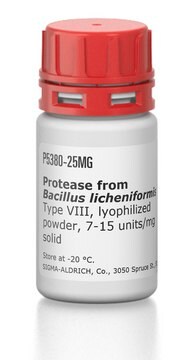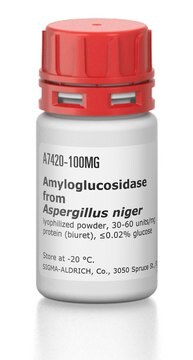Kluczowe dokumenty
G3293
Glucose Assay Reagent
for use with enzymatic assay kits GAHK20, SCA20, FA20, SA20
About This Item
Polecane produkty
Poziom jakości
klasy chemiczne analitów
sugars (glucose)
metody
photometry: suitable
zanieczyszczenia
≤0.005% Creatine phosphokinase, glutathione reductase, myokinase, NADH-oxidase,NADPH oxidase, phosphogluconic dehydrogenase, phosphoglucose isomerase, lactic dehydrogenase
<0.01% ATP-ase, myokinase
Zastosowanie
food and beverages
general analytical
temp. przechowywania
2-8°C
Specyficzność
Zastosowanie
produkt powiązany
Kod klasy składowania
11 - Combustible Solids
Klasa zagrożenia wodnego (WGK)
WGK 3
Temperatura zapłonu (°F)
Not applicable
Temperatura zapłonu (°C)
Not applicable
Środki ochrony indywidualnej
Eyeshields, Gloves, multi-purpose combination respirator cartridge (US)
Certyfikaty analizy (CoA)
Poszukaj Certyfikaty analizy (CoA), wpisując numer partii/serii produktów. Numery serii i partii można znaleźć na etykiecie produktu po słowach „seria” lub „partia”.
Masz już ten produkt?
Dokumenty związane z niedawno zakupionymi produktami zostały zamieszczone w Bibliotece dokumentów.
Klienci oglądali również te produkty
Protokoły
Enzymatic Assay of α-Glucosidase by the Modified Boehenger Procedure (EC 3.2.1.20)
To standardize an enzymatic assay procedure of cellulase.
Ten protokół wykorzystuje test spektrofotometryczny do oceny aktywności celulazy. Celulaza z Aspergillus niger katalizuje hydrolizę wiązań endo-1,4-β-D-glikozydowych.
This procedure may be used for the determination of Amyloglucosidase activity using starch as the substrate.
Nasz zespół naukowców ma doświadczenie we wszystkich obszarach badań, w tym w naukach przyrodniczych, materiałoznawstwie, syntezie chemicznej, chromatografii, analityce i wielu innych dziedzinach.
Skontaktuj się z zespołem ds. pomocy technicznej






